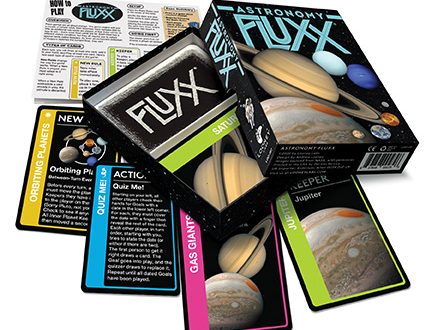Astronomy Fluxx from Looney Labs is the latest edition to the Fluxx line of card games that have ever-changing rules, this time taking on space itself. Fluxx has seen numerous incarnations in different genres, and crossovers with famous media like Star Trek and Firefly. Looney Labs has even applied the flexible game to educational grounds, with decks like Anatomy Fluxx, Chemistry Fluxx, and Math Fluxx. While these others showed how numbers and materials can work together on a tangible plane, Astronomy Fluxx takes things into the cosmos to show how everything connects.

Gameplay in Astronomy Fluxx follows the well-established near-chaos of the Fluxx line. The game begins with basic rules of each player drawing a card and playing a card. These cards may be Keepers, that players collect to achieve a Goal and win the game; special Actions; or New Rules that can change things so that players draw five or play four, or to limit hands. Compared with other Fluxx games, Astronomy Fluxx is fast-paced, with numerous New Rules that add bonus draws. Players may discard Goals or Keepers to get free cards as well as play an Action card with no effect to get another draw.
Many of the New Rule cards unique to Astronomy Fluxx fit with its cosmic theme. The Mystery Play allows players to simply draw a card and immediately play it, just to see what will happen, as one does not know what can be found when exploring outer space. The Telescope card prompts players to take a peek at opponents’ hands or the draw deck. Players can even explore orbits, with Keepers on the table rotating as they would around a major axis in the Solar System.
In addition to its unique gameplay, Astronomy Fluxx dives deep into its educational aspect with the Quiz Me Action card. Many of the Goals have dates printed on them for major events in space exploration, such as Yuri Gagarin being the first man in space (1961) and the first successful landing on Mars (1976). A player who gives the year correctly receives a free draw from the deck. The Name a Constellation New Rule gives players free draws for naming a constellation not yet brought up in the game. It begins easily enough with the likes of Orion, Draco, and the zodiac, but the task becomes increasingly difficult as the game goes on.
Many of the Goals connect Keepers to suggest astronomical concepts, such as Pluto and Asteroid meeting to make the Kuiper Belt, or collecting any of the terrestrial planets for Inner Planets. With many of the Goals tied to exploration, however, Astronomy Fluxx leans toward certain Keepers being particularly powerful, especially the Spacecraft. Veteran players will be mindful of this, watching for opponents to play certain Keepers and eagerly nabbing them for themselves.
Astronomy Fluxx is a card game for two to six players aged eight and up. It is a quickly paced game usually lasting 10 to 15 minutes. But with the rules constantly changing, some games are very quick, while others go on for 20 to 30 minutes. Since games are short and unique thanks to the randomized gameplay, replayability is very high. Astronomy Fluxx is a great addition to the classroom and to especially nerdy game nights with its easy play using familiar and not-so-familiar examples of space science.
 Blogcritics The critical lens on today's culture & entertainment
Blogcritics The critical lens on today's culture & entertainment




